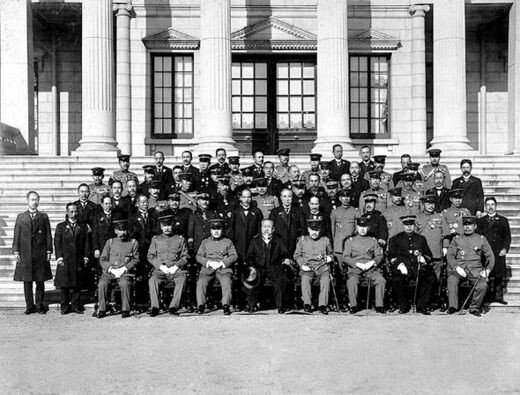hankyoreh
Links to other country sites 다른 나라 사이트 링크
106 named as collaborators with colonial Japan

In what is the first decision of its kind, a government body has formally found 106 persons to have engaged in anti-Korean activity and collaborated with Japan during its takeover and colonization of the peninsula. All 106 actively cooperated with Japan during the initial years of its history of intervention in Korea during the last century.
The Presidential Committee for the Inspection of Collaborations or Japanese Imperialism [sic], headed by the well-known historian Kang Man-kil, announced yesterday that of the 120 individuals that were included in its initial inquiry into collaborationist activities from the period between the Russo-Japanese War (1904-1905) to the March First Campaign (1919), it has classified 106 as collaborators.
It is historically significant that a government body has made such findings, as treasonous activities have usually been studied only in academia and by nongovernmental research institutes.
This recent finding may provide the legal basis for denying the descendants of collaborators claims to land given to their families by Japanese colonial authorities as reward for their services to Imperial Japan. In recent years, the descendants of some of what are widely considered to be the clearest cases of collaboration have been trying to assert their rights to land currently occupied by other interests - such as U.S. military bases, for example - but courts have had to let them exercise ownership for lack of an official definition of 'individuals that have committed treason.' It is expected that the National Assembly will soon pass legislation that would allow the state to claim land that clearly had something to do with the collaborative activities of its owner.
In 1948, following Liberation, the Republic of Korea's first National Assembly established the Special Committee on Anti-Korean Activities (Banmin Teugwi) and charged it with investigating crimes of collaboration. Its investigative activities soon became a threat to certain groups in Korean society, and the committee suddenly found itself routinely harassed and attacked by organized mobs and was eventually disbanded. Once the Special Committee was thwarted, the task of rectifying some of the lingering issues of colonial occupation was ignored by the Korean government during the decades of dictatorship.
Some of the 106 names included in the findings are virtually synonymous with the word "traitor" for having been described as collaborators in school textbooks even during successive Korean governments. Major figures include Yi Wan-yong, instrumental in the signing of the Ulsa Treaty between Korea and Japan; O Je-yeong, deputy of the Junchuwon, an advisory body to the Japanese colonial government; Choe Jin-tae, the police official who worked to annihilate Korea's "Righteous Army"; Baek Wan-hyeok, who was a founding partner in the Oriental Development Company (Dongyang Cheoksik Hoesa) was an active participant in the economic exploitation of Korea; Yi Yong-gu, chairman of the Iljinhoe, an important pro-Japanese organization; Yi In-jik, a member of the colonial government's scholarly academy Gyeong Hak Won and the editor of its academic journal, as well as the author of the famous early modern Korean short story "Tears of Blood"; and Seonu Il, editor of the colonial government's official newspaper, Maeil Sinbo.
Yi Ji-yong, a member of the "Ulsa Five," five Koreans who were key in the signing of the Ulsa Treaty, was excluded from this round of findings because his descendants have not been officially informed of the committee's decision.
The committee plans to issue reports each year as it studies the colonial period following the March First Campaign of 1919.
Please direct questions or comments to [englishhani@hani.co.kr]
Editorial・opinion
![[Column] Park Geun-hye déjà vu in Yoon Suk-yeol [Column] Park Geun-hye déjà vu in Yoon Suk-yeol](https://flexible.img.hani.co.kr/flexible/normal/500/300/imgdb/original/2024/0424/651713945113788.jpg) [Column] Park Geun-hye déjà vu in Yoon Suk-yeol
[Column] Park Geun-hye déjà vu in Yoon Suk-yeol![[Editorial] New weight of N. Korea’s nuclear threats makes dialogue all the more urgent [Editorial] New weight of N. Korea’s nuclear threats makes dialogue all the more urgent](https://flexible.img.hani.co.kr/flexible/normal/500/300/imgdb/original/2024/0424/7317139454662664.jpg) [Editorial] New weight of N. Korea’s nuclear threats makes dialogue all the more urgent
[Editorial] New weight of N. Korea’s nuclear threats makes dialogue all the more urgent- [Guest essay] The real reason Korea’s new right wants to dub Rhee a founding father
- [Column] ‘Choson’: Is it time we start referring to N. Korea in its own terms?
- [Editorial] Japan’s rewriting of history with Korea has gone too far
- [Column] The president’s questionable capacity for dialogue
- [Column] Are chaebol firms just pizza pies for families to divvy up as they please?
- [Column] Has Korea, too, crossed the Rubicon on China?
- [Correspondent’s column] In Japan’s alliance with US, echoes of its past alliances with UK
- [Editorial] Does Yoon think the Korean public is wrong?
Most viewed articles
- 1‘We must say no’: Seoul defense chief on Korean, USFK involvement in hypothetical Taiwan crisis
- 2Will NewJeans end up collateral damage in internal feud at K-pop juggernaut Hybe?
- 3[Column] Park Geun-hye déjà vu in Yoon Suk-yeol
- 4Why Korea shouldn’t welcome Japan’s newly beefed up defense cooperation with US
- 5Thursday to mark start of resignations by senior doctors amid standoff with government
- 6N. Korean hackers breached 10 defense contractors in South for months, police say
- 7[Guest essay] The real reason Korea’s new right wants to dub Rhee a founding father
- 8[Column] ‘Choson’: Is it time we start referring to N. Korea in its own terms?
- 9Kim Jong-un expressed ‘satisfaction’ with nuclear counterstrike drill directed at South
- 10[Editorial] New weight of N. Korea’s nuclear threats makes dialogue all the more urgent